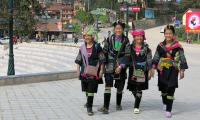Reinforcing efforts to include indigenous peoples

Over the last year, a total of 28 national human rights institutions (NHRIs) have participated in workshops on indigenous peoples’ rights around the world. At these workshops, facilitated by the Danish Institute for Human Rights and regional experts on indigenous issues, these NHRIs have strengthened their knowledge on the international and regional legal mechanisms that can protect the rights of indigenous peoples and strengthen their participation in decision-making that affects them.
There are an estimated 370 million indigenous people in the world, living across 90 countries. Indigenous communities are present in all geographic regions and represent 5,000 different cultures. While they make up less than 5 percent of the world's population, indigenous people account for 15 percent of the poorest. They are more likely to suffer from malnutrition and often lack adequate access to social protection systems and economic resources.
But the distance between NHRIs in Asia, Africa and Central and South America and these regional and international mechanisms for the promotion and protection of indigenous peoples’ rights, such as the Office of the UN High Commissioner for Human Rights (OHCHR), the Expert Mechanism on the Rights of Indigenous Peoples (EMRIP) and the International Labour Organization (ILO), can be significant.
18 NHRIs have now been invited to Geneva for a three-day workshop program that will further strengthen their engagement with indigenous peoples as well as strengthening dialogue between NHRIs on how they can effectively use their mandate to promote and protect the rights of indigenous peoples. From July 10 to 12,the 18 participating NHRIs will meet directly with representatives from EMRIP, OHCHR and ILO.
Documenting the human rights and development situation of indigenous peoples is a critical step towards discussing it with duty-bearers and other external stakeholders. We hope that our NHRI colleagues will return to their home countries with new inspiration, and greater knowledge of how to engage with international human rights mechanisms in the promotion and protection of indigenous peoples’ rights
EMRIP provides the Human Rights Council with expertise and advice on the rights of indigenous peoples as set out in the United Nations Declaration on the Rights of Indigenous Peoples, and assists member states, upon request, to achieve the ends of the Declaration through the promotion, protection and fulfilment of the rights of indigenous peoples.
The ILO has been engaged with indigenous peoples’ issues since the 1920s. It is responsible for the Indigenous and Tribal Peoples Convention, 1989 (No. 169), the only international treaty open for ratification that deals exclusively with the rights of these peoples.
OHCHR represents the world's commitment to universal ideals of human dignity. It has an unique mandate from the international community to promote and protect all human rights.
The workshop is part of the global project ‘Indigenous Navigator’.
'The Indigenous Navigator' is a framework and set of tools for and by indigenous peoples to systematically monitor the level of recognition and implementation of their rights.
